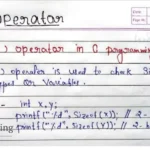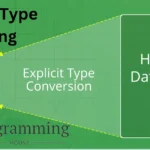What is Casting in C++ with example?
Casting in C++ is the process of converting a variable from one type to another. This can be necessary for various reasons, such as performing operations that require matching types, interfacing with legacy code, or optimizing performance. Casting ensures that data types are correctly interpreted by the compiler and runtime environment, preventing errors and enabling more precise control over how data is handled.
In C++, casting can be broadly categorized into two types: implicit casting and explicit casting. Implicit casting is automatically handled by the compiler, whereas explicit casting requires the programmer to specify the type conversion. In this blog we explain “What is casting in C++ with example” in detail.
Implicit Casting
Implicit casting (or automatic type conversion) occurs when the compiler automatically converts one data type to another. This usually happens when mixing types in expressions or when passing arguments to functions.
Example of Implicit Casting
cpp#include <iostream>
int main() {
int a = 10;
double b = a; // implicit casting from int to double
std::cout << "Value of b: " << b << std::endl;
return 0;
}
In the above example, the integer variable a is implicitly cast to a double when assigned to b. The compiler automatically handles the conversion from int to double.
Explicit Casting
Explicit casting requires the programmer to specify the type conversion. This is done using cast operators. C++ provides several ways to perform explicit casting, including C-style casts, function-style casts, and the newer, safer C++ cast operators.
C-Style Casts
C-style casting is inherited from the C programming language. It uses a simple syntax but lacks type safety and can be difficult to read and maintain.
Syntax
cpp(type) expression
Example of C-Style Cast
cpp#include <iostream>
int main() {
double x = 10.5;
int y = (int)x; // C-style cast from double to int
std::cout << "Value of y: " << y << std::endl;
return 0;
}
In this example, the double variable x is explicitly cast to an integer using C-style casting. The fractional part of x is discarded, and y becomes 10.
Function-Style Casts
Function-style casting is similar to C-style casting but uses a different syntax. It is slightly more readable but still lacks the safety features of the newer C++ casts.
Syntax
cpptype(expression)
Example of Function-Style Cast
cpp#include <iostream>
int main() {
double x = 10.5;
int y = int(x); // function-style cast from double to int
std::cout << "Value of y: " << y << std::endl;
return 0;
}
In this example, x is cast to an int using function-style casting, resulting in the same outcome as the previous example.
C++ Cast Operators
C++ introduces four specific cast operators that provide more control and type safety: static_cast, dynamic_cast, const_cast, and reinterpret_cast.
static_cast
static_cast is used for conversions between related types, such as from one numeric type to another, or from a pointer to a base class to a pointer to a derived class.
Syntax
cppstatic_cast<type>(expression)
Example of static_cast
cpp#include <iostream>
int main() {
double x = 10.5;
int y = static_cast<int>(x); // static_cast from double to int
std::cout << "Value of y: " << y << std::endl;
return 0;
}
Here, static_cast converts x from a double to an int, discarding the fractional part.
dynamic_cast
dynamic_cast is used for safe downcasting in class hierarchies. It ensures that the cast is valid and returns nullptr if the cast fails. dynamic_cast requires the presence of at least one virtual function in the base class.
Syntax
cppdynamic_cast<type*>(expression)
Example of dynamic_cast
cpp#include <iostream>
class Base {
public:
virtual ~Base() = default; // virtual destructor for polymorphic behavior
};
class Derived : public Base {
public:
void show() {
std::cout << "Derived class method" << std::endl;
}
};
int main() {
Base* b = new Derived();
Derived* d = dynamic_cast<Derived*>(b); // safe downcast
if (d) {
d->show();
} else {
std::cout << "Cast failed" << std::endl;
}
delete b;
return 0;
}
In this example, dynamic_cast safely casts the Base pointer b to a Derived pointer. If the cast is not valid, d would be nullptr, preventing unsafe access.
const_cast
const_cast is used to add or remove the const qualifier from a variable. This is useful when interfacing with APIs that do not use const correctly but should be used with caution.
Syntax
cppconst_cast<type>(expression)
Example of const_cast
cpp#include <iostream>
void print(const int& x) {
int& y = const_cast<int&>(x);
y = 20; // modifying the value through y
std::cout << "Value of x: " << x << std::endl;
}
int main() {
int a = 10;
print(a);
std::cout << "Value of a: " << a << std::endl;
return 0;
}
Here, const_cast is used to remove the const qualifier from x, allowing modification. This example demonstrates the potential risks of using const_cast.
reinterpret_cast
reinterpret_cast is used for low-level casting, such as casting between unrelated pointer types or converting between pointer and integer types. It should be used with extreme caution as it can lead to undefined behavior.
Syntax
cppreinterpret_cast<type>(expression)
Example of reinterpret_cast
cpp#include <iostream>
int main() {
int a = 42;
void* p = &a; // void pointer to a
int* ip = reinterpret_cast<int*>(p); // reinterpret_cast back to int*
std::cout << "Value of *ip: " << *ip << std::endl;
return 0;
}
In this example, reinterpret_cast casts the void* pointer p back to an int* pointer. This type of casting is often used in systems programming and should be handled with care.
When to Use Each Cast
- Implicit Casting: Use when safe and obvious, such as between numeric types.
- C-Style and Function-Style Casts: Generally discouraged in modern C++ due to lack of type safety and clarity.
static_cast: Use for well-defined conversions that are known to be safe, such as numeric conversions and upcasting/downcasting in class hierarchies (when certain).dynamic_cast: Use for safe downcasting in polymorphic class hierarchies.const_cast: Use to cast awayconstorvolatilequalifiers, typically when interfacing with legacy code or APIs.reinterpret_cast: Use for low-level, non-portable casts that require precise control over how data is interpreted.
Conclusion
Casting in C++ is a powerful feature that allows developers to convert data types to suit specific needs. While implicit casting provides convenience, explicit casting gives control and precision. The four C++ cast operators (static_cast, dynamic_cast, const_cast, and reinterpret_cast) offer different levels of safety and functionality, catering to various casting requirements.
By understanding and correctly applying these casting techniques, C++ programmers can write more robust, efficient, and maintainable code. As with any powerful tool, casting should be used judiciously, with careful consideration of potential risks and benefits.




